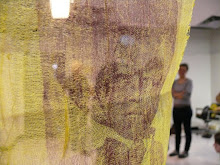























Here are photos from the performance of Security/Boundaries/Eroticism at Control Lab in May of 2010, in Montréal.
There was music that accompanied the performance : http://www.mediafire.com/?3qmhiyiwnxn : by 23
Security/Boundaries/Eroticism
Performance, Wearables constructed from woven cotton fabric woven and dyed using woven shibori techniques
Thanks to TwoThree for sound and Tyler for the incredible voice, and to Sandra Chirico for make-up
& to all the gorgeous models for modeling the collection. That means thank you Alannah, Aaron, Anita, Rossel, Rochelle, Alfonso, Robyn and Mónica. . . YOU all made the show happen so well!!! Thank you to Paula Peña Navarro for photo credits.
“Airport screening practices might be understood as symptomatic, then, of a broader security regime in which looking authorizes touching and touching can become torture.”
Points of Departure: The Culture of US Airport Screening, by Lisa Parks
“Please remove your clothing at the gate and have your passport ready.”
SBE is a series of wearables designed to facilitate passage in heightened security airport checkpoints. At these sites, bodies are forced to allow strangers to touch them in ways only their intimates would otherwise, and people are asked to disrobe in public space. Boundaries of personal space are breached, and scanning and profiling practices mirror techniques used in holding centers for suspects in the 'war on terror' such as Guantanamo and Abu Ghraib prisons.
With this series I seek to reference the way power employs and alters our understanding of eroticism in the abuse of power inherent to these spaces. In doing so I also reference the perverse eroticism we have seen used as torture methods for detainees, as well as the way the West has eroticized the Far and Middle East for centuries.
Such extreme policing of the body as occurs at these sites of passage fails to address any cause of the concerns of global “terrorism.” Workers, especially for the TSA, are underpaid and overstimulated with false imagery to keep them on their toes, though this most often only works to confuse workers and hold up travelers. All kinds of dangerous materials and objects have passed through these checkpoints, and so this obsessive screening and prohibition of items becomes a rather surreal effect of the anti-terrorism anxiety, allowing for closer surveillance of travelers, rampant racial profiling, and further control of traveling populations, without necessarily making travel any safer.
This performance consisted of an airport security checkpoint on an impromptu runway where models were subjected to invasive bodily searches by security personnel, and some were disrobed as passive and interested audiences looked on. As we see must consent to this scrutiny when we choose to travel on planes, this performance sought to exemplify the absence of personal boundaries in air travel particularly. Bodies are disrobed and eroticized, exoticized into potential weapons, and colonized imaginations are given full reign over our bodies.
“please keep your passport ready and available at all times so we can verify your right to exist”








